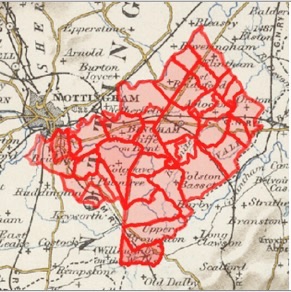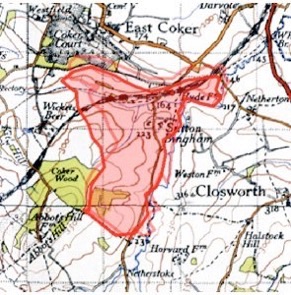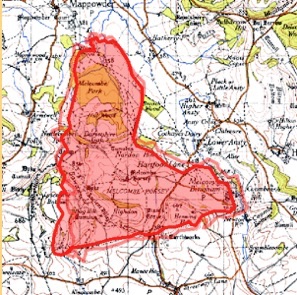The Bingham family is English in origin. Two separate and well documented families assumed the name. One was the Bingham family of Nottingham; the other, the Bingham family of Somerset and Dorset.
Some people have contended that these families are one and the same, but recent scholarship has disproved this theory. English cousins Frank Creswell and John Bingham, both Bingham family researchers, devoted years to locating and translating ancient documents such as wills, probates, and court records. Their comments on the origins of the Bingham families follow.
An Angle settlement near the old Roman town of Margidunum within the present county of Nottingham is the only geographic place in England named Bingham. Recorded in the Domesday survey of 1086, William the Conqueror granted Bingham and at least forty-five other manors to Roger de Busli. By 1098 Roger de Busli was dead and Bingham passed to other families. The family name Bingham may have remained with some individuals living there. Ralph Bugge took over the charter of Bingham in 1263. He became Ralph Bugge of Bingham. His elder son, Richard Bugge, inherited and lived on the Manor of Bingham. He dropped the name Bugge and became Sir Richard Bingham
( Sir Richard Bingham could not have adopted the name of Bingham before the grant of the Charter to his father in 1263. His adoption of the name occurred some 119 years after the birth of Ralph c. 1144, father of Robert Bishop of Salisbury. The Binghams of Nottingham therefore have an entirely separate origin from the Melcombe and County Mayo, Ireland, Binghams.)
The Bingham families of Sutton Bingham in Somerset; Melcombe Bingham, Dorset; and County Mayo, Eire are related, but opinions differ on their relationship to the Bingham family of Nottingham.
The Heralds Visitation in 1587 by Robert Cooke, Clarenceux, of the Melcombe Bingham family give four dubious generations before Ralph de Bingham of Somerset. Ralph had two sons: Ralph the heir of Sutton and Robert the younger son. Robert was a canon of Salisbury Cathedral and elected Bishop of Salisbury by his fellow canons in 1228. He died in 1246 and is buried in the Cathedral. Despite family claims to the contrary there is no evidence that he was a priest at Bingham, Nottinghamshire. Robert was reputedly born in 1164, so if his father was about 20 years of age at the time of Robert’s birth, we have the date 1144 when this de Bingham family existed. They later dropped the de from their surname.
Ralph de Bingham junior, the heir of Sutton Bingham, also had two sons. The elder son, William, was granted Sutton Bingham by Charter on his marriage to Cecelia, daughter and heiress of Geoffrey de Mandeville, Lord of Hardington and Coker. He took as his arms, Ermine three lions rampant in chief.
The younger son, Robert, acquired Melcombe Binghamon his marriage to Lucy, daughter and heiress of Sir Richard Turberville. He took as his arms, Azure a bend cotised between six crosses patée or. The County Mayo Binghams are a junior line of the Melcombe Bingham family from whom the Earldoms of Lucan and Clanmorris descend.
Both Sutton Bingham and Melcome Bingham passed out of the Bingham family; Sutton in 1448, Melcombe about 1900. Descendants of both Sutton and Melcome Bingham families had connections with Ireland.
ORIGINS

BINGHAM FAMILY
BINGHAM FAMILY

BINGHAM FAMILY

Contributed by John Bingham and Frank Creswell, 8th October 2000
edited by Donna Bingham Munger
To learn more about the early Bingham families click on a link to the right.
